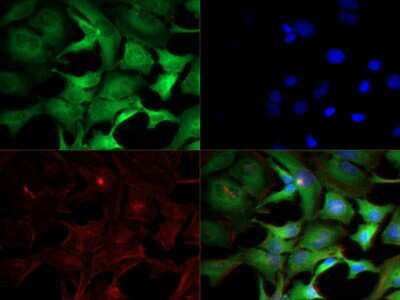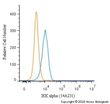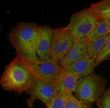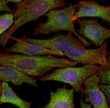IKK alpha (CHUK) Mouse Monoclonal Antibody [Clone ID: 14A231]
Frequently bought together (2)
Transient overexpression lysate of conserved helix-loop-helix ubiquitous kinase (CHUK)
USD 605.00
Other products for "IKK alpha"
Specifications
| Product Data | |
| Clone Name | 14A231 |
| Applications | FC, IHC, WB |
| Recommended Dilution | Flow Cytometry: (Intracellular): 0.25-0.5 ug/10^6 cells, Chromatin Immunoprecipitation (ChIP): 1:10-1:500, Western Blot: 1 ug/ml, Simple Western: 10 ug/ml, Immunoprecipitation: 1-2 ug/ml, Flow (Intracellular): Flow Cytometry: (Intracellular): 0.25-0.5 ug/10^6 cells, Immunohistochemistry-Frozen, Chromatin Immunoprecipitation: 1:10 - 1:500, Immunohistochemistry: 1:200, Immunohistochemistry-Paraffin: 5ug/ml, Immunocytochemistry/ Immunofluorescence: 1:10 |
| Reactivities | Human, Mouse, Primate |
| Host | Mouse |
| Isotype | IgG1, kappa |
| Clonality | Monoclonal |
| Immunogen | This antibody was raised against a His-tagged full-length human IKK alpha protein. |
| Formulation | PBS containing 0.05% BSA, 0.05% Sodium Azide. Store at 4C short term. Aliquot and store at -20C long term. Avoid freeze-thaw cycles. |
| Concentration | lot specific |
| Purification | Protein G purified |
| Conjugation | Unconjugated |
| Storage | Store at -20°C as received. |
| Stability | Stable for 12 months from date of receipt. |
| Gene Name | conserved helix-loop-helix ubiquitous kinase |
| Database Link | |
| Background | NF-kB (nuclear factor kB) is sequestered in the cytoplasm by IkB family of inhibitory proteins that mask the nuclear localization signal of NF-kB thereby preventing translocation of NF-kB to the nucleus. External stimuli such as tumor necrosis factor or other cytokines results in phosphorylation and degradation of IkB releasing NF-kB dimers. NF-kB dimer subsequently translocates to the nucleus and activates target genes. Synthesis of IkBa is autoregulated. IkB proteins are phosphorylated by IkB kinase complex consisting of at least three proteins, IKK1/a, IKK2/b, and IKK3/g. In vitro, IKK1/a and IKK2/b can form homo- and heterodimers that can phosphorylate IkBs at the regulatory serine residues directly. IKK1/a and IKK2/b are phosphorylated by NF-kB-inducing kinase (NIK) and MAP kinase kinase kinase-1 (MEKK1), respectively. Targeted disruption of IKK1/a gene in mice results in skin and limb abnormalities and death of newborns. |
| Synonyms | IKBKA; IKK-alpha; IKK1; IKKA; NFKBIKA; TCF16 |
| Note | Use in Flow Intracellular reported in scientific literature (PMID 24804954) |
| Reference Data | |
| Protein Families | Druggable Genome, Protein Kinase |
| Protein Pathways | Acute myeloid leukemia, Adipocytokine signaling pathway, Apoptosis, B cell receptor signaling pathway, Chemokine signaling pathway, Chronic myeloid leukemia, Cytosolic DNA-sensing pathway, Epithelial cell signaling in Helicobacter pylori infection, MAPK signaling pathway, NOD-like receptor signaling pathway, Pancreatic cancer, Pathways in cancer, Prostate cancer, RIG-I-like receptor signaling pathway, Small cell lung cancer, T cell receptor signaling pathway, Toll-like receptor signaling pathway |
Documents
| Product Manuals |
| FAQs |
| SDS |
{0} Product Review(s)
0 Product Review(s)
Submit review
Be the first one to submit a review
Product Citations
*Delivery time may vary from web posted schedule. Occasional delays may occur due to unforeseen
complexities in the preparation of your product. International customers may expect an additional 1-2 weeks
in shipping.






























































































































































































































































 Germany
Germany
 Japan
Japan
 United Kingdom
United Kingdom
 China
China










